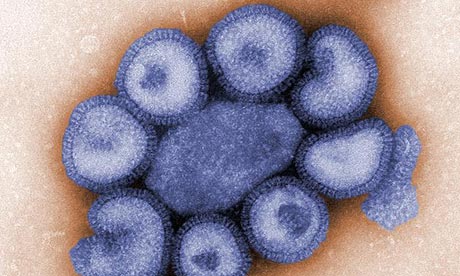
Pregnant women, babies under one and people with underlying health conditions will continue to be treated by their family doctor rather than the government's new swine flu helpline.
Concerns that medically at-risk groups, such as mothers-to-be and cancer patients, need to be assessed by a health professional rather than a call centre worker have prompted ministers to agree that the new national pandemic flu service will not seek to cover vulnerable patients.
A Department of Health (DH) spokeswoman said: "If you have a child under one you should continue to call your GP. If you are in an at-risk group, antivirals are available through the national pandemic flu service, but you will be advised to contact your GP, especially if you are having treatment for a serious condition like cancer. If you are feeling unwell and have an underlying health condition like asthma or are pregnant, take antivirals as soon as possible and keep in touch with your GP."
Senior doctors had privately voiced concerns to the DH that call handlers were not the best people to deal with patients who are potentially at greater risk if they develop the H1N1 virus than healthy adults who have no medical problems.
The 1,500 staff of a new network of about 20 call centres have also been given special training in how to pick up potential cases of meningitis in children, amid fears it could be misdiagnosed as swine flu because the symptoms are similar. The questionnaire staff will go through with callers "includes questions so that potential signs of meningitis are picked up and referred for immediate medical advice", a DH spokeswoman said.
Gordon Brown hailed the new flu helpline as proof of the government's "enormous effort" to try to minimise the pandemic's impact. "Robust plans" are in place to tackle the H1N1 virus and are being pursued in "a calm and organised and ordered way", he said.
Steve Field, chairman of the Royal College of General Practitioners, said it was "entirely appropriate" that family doctors continued to play the key role in assessing and treating patients in these vulnerable groups. "We welcome the introduction of the new flu service because GPs across the country are under extreme pressure due to the number of patients calling and attending with concerns about swine flu," he said.
"Very few of the calls are from people who actually have influenza. But because of the volume of work these calls create, GPs are being distracted from spending time with patients who are ill with either swine flu or other conditions."
The new helpline will initially operate for 15 hours a day handling up to 200,000 calls a day. Staff have been trained in how to use a "clinically approved diagnostic tool" that will indicate if someone has swine flu. NHS Direct personnel will work alongside call centre staff for the first two days, and after that call handlers who need advice will be able to call a helpdesk.
Yesterday, the death toll from swine flu reached 31. The NHS in the West Midlands, one of the infection "hotspots", confirmed a third person from the region had died after testing positive for the H1N1 virus. None of the victim's personal details, or information on whether they had an underlying health condition, will be released until the postmortem has been carried out.
The DH will tomorrow publish details of the latest numbers of people who have died from or been hospitalised by the pandemic.
Two biotechnology companies have also announced that the world's first human trials of a swine flu vaccine have begun in Australia. Adelaide-based Vaxine began trials on Monday with 300 adult volunteers, while Melbourne's CSL has 240 people enrolled in its seven-month trial. It is likely to be six to eight weeks before results are available to verify whether the vaccine was effective.
The UK government has ordered up to 132m doses of the v accine from two other companies, GlaxoSmithKline (GSK) and Baxter. Yesterday, GSK said it would be ready to begin shipping supplies in September.
Fewer than four out of 10 health workers believe their organisation is managing to cope with the extra flow of patients caused by swine flu, according to a poll carried out by the Health Service Journal and Nursing Times.
Just 37% of clinicians, including doctors and nurses, agreed or strongly agreed with the statement that their organisation was coping well. Another 30% neither agreed or disagreed, while 13% disagreed and 5% strongly disagreed.

